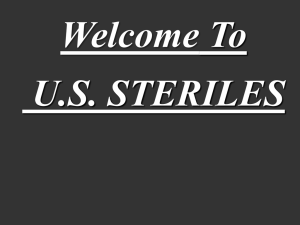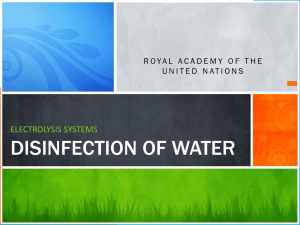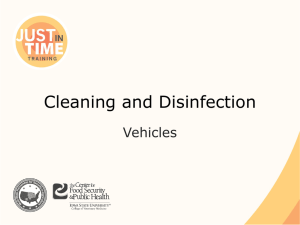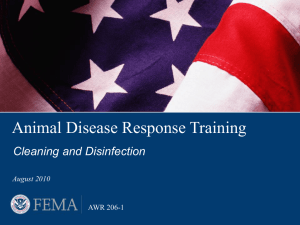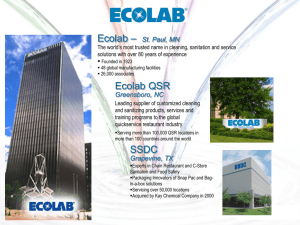05-Cleaning-and-Disinfection-Premises-JIT-PPT
advertisement
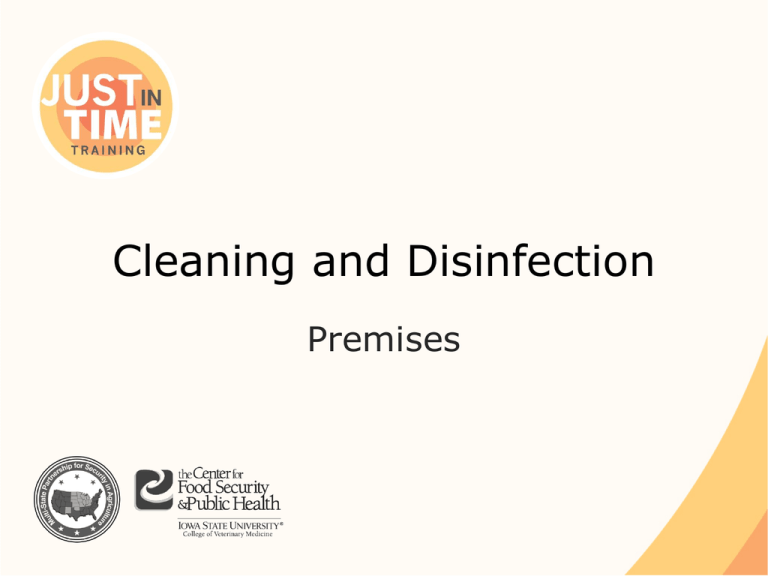
Cleaning and Disinfection Premises Biosecurity Work Zones Just In Time Training Cleaning and Disinfection: Premises Basic C&D Protocol ● Cleaning – Dry Cleaning – Washing – Rinse and dry ● Disinfection – Application – Contact Time – Rinse and dry ● Downtime Just In Time Training Cleaning and Disinfection: Premises Preparation ● Turn fans off ● Disconnect electricity ● Remove sensitive equipment ● Alternative electrical supply for C&D equipment and lighting Just In Time Training Cleaning and Disinfection: Premises Vectors ● To avoid transfer of pathogens – Detect and remove disease vectors – Seal rodent entrances – Remove and prohibit wild bird nesting areas – Eliminate insect breeding areas Just In Time Training Cleaning and Disinfection: Premises Preparation ● Footbaths – Set up at entrance/exits – Ineffective if used incorrectly False sense of security Should not be sole process of disinfection – Use fresh solution – Allow contact time Just In Time Training Cleaning and Disinfection: Premises Disinfectant Preparation ● Use according to product label ● Only EPA-registered or approved products ● Prepare fresh solutions – Old solutions may have reduced efficacy ● Test kits can help check concentration Just In Time Training Cleaning and Disinfection: Premises Basic Protocol ● Systematic manner – Start at back and work toward front – Start at ceiling and work down walls – Small sections at a time – Work toward the drain ● Use marking tape to indicate completed areas Just In Time Training Cleaning and Disinfection: Premises Dry Clean ● Use brooms, shovels, brushes, scrapers ● Moisten to control dust ● Remove – Visible organic material – Washable items – Rotten wood fixtures ● Scrape windowsills, floors ● Dispose of debris in biosecure manner Just In Time Training Cleaning and Disinfection: Premises Wash and Rinse ● Wash area with detergent using sprayer, scrub brush – Avoid high pressure if highly contagious ● May need pre-soaked ● Scrubbing may be necessary ● Steam – Effective for cracks, crevices, pipework ● Rinse with clean, warm water ● Allow to dry overnight Just In Time Training Cleaning and Disinfection: Premises Disinfection ● Apply EPA-registered disinfectant – Allow appropriate contact time – Must remain “wet” – Reapply if needed ● Rinse with clean, warm water ● Allow to air-dry Just In Time Training Cleaning and Disinfection: Premises Building Interior ● Ensure C&D of interior components – Water dispensers, troughs, augers, fans ● Electrical equipment – Turned off first – Wipe clean, sanitize Just In Time Training Cleaning and Disinfection: Premises Building Exterior ● Width will vary with pathogen – May be as wide as 10 feet ● Flame gun – Wet surfaces prior to distinguished areas treated ● Fan inlets – EPA-registered disinfectant with low pressure sprayer Just In Time Training Cleaning and Disinfection: Premises Material Composition ● Concrete = porous – Difficult to clean – Registered product, flame gun ● Metal = easier to clean – Some products corrosive – Flame gun ● Wood = very porous – Discard if possible ● Soil, sand, clay – No environmentally safe product Just In Time Training Cleaning and Disinfection: Premises Downtime ● Free of any animals or activity ● Reduces pathogens by drying ● Time varies based on pathogen – Three times expected incubation period ● Block of area Just In Time Training Cleaning and Disinfection: Premises Slurry Pits ● Decontaminate by chemical process that alters the pH – Vigorous stirring – Maintain pH for several days ● Precautionary measures – Minimum of 2 personnel – Wear respirators, safety harnesses, lifeline – Area well ventilated due to toxic gases produced with agitation Just In Time Training Cleaning and Disinfection: Premises SPECIFIC PRODUCTION SITUATIONS Just In Time Training Cleaning and Disinfection: Premises Poultry Premises ● Egg processing equipment – Egg belts, flats, buggies, packing machines ● Nesting boxes ● Egg storage rooms ● Open floor areas ● Curtains Just In Time Training Cleaning and Disinfection: Premises Dairy Facilities ● Milking equipment – Milking units, strainers, coolers, bulk tank – Removal of milk-film or deposits ● Input from manager, personnel may be useful ● Products must specifically list milking equipment Just In Time Training Cleaning and Disinfection: Premises Swine Facilities ● Special items – Farrowing pens, slats, slurry alleys, pits – Electrical equipment – Bars, crates, gates ● Clean and disinfect without leaving residual chemicals ● Phenolic disinfectants should be avoided Just In Time Training Cleaning and Disinfection: Premises Equine Facilities ● Equine facilities highly variable – Products labeled for wood, concrete should be applied once organic debris removed – Special attention to metal bars on stalls – Flame gun for non-flammable surfaces Just In Time Training Cleaning and Disinfection: Premises C&D Equipment ● Equipment used for C&D procedures must also be either cleaned and disinfected before reuse or properly disposed of Just In Time Training Cleaning and Disinfection: Premises Safety ● Chemical Hazards – Skin, eye, respiratory irritation ● Physical Hazards – Slips, trips, falls – High pressure sprayer Just In Time Training Cleaning and Disinfection: Premises Environmental Hazards ● Runoff must be avoided – Infectious material – Chemical solution ● Toxic to aquatic organisms ● Further spread of pathogens Just In Time Training Cleaning and Disinfection: Premises Evaluation ● Areas properly cleaned/disinfected ● Personnel aware of/implementing C&D measures ● Proper disinfectant selected – Appropriate concentration – Correct contact time achieved ● C&D Waste – Minimize or avoid environmental impact Just In Time Training Cleaning and Disinfection: Premises References ● https://fadprep.lmi.org ● USDA APHIS. FAD PReP NAHEMS. – Highly Pathogenic Avian Influenza Standard Operating Procedures: Cleaning and Disinfection. February 2010. – Foot-And-Mouth Disease. Standard Operating Procedures: Cleaning and Disinfection. February 2010. – NAHEMS Guidelines: Cleaning and Disinfection. June 2011. Just In Time Training Cleaning and Disinfection: Premises Acknowledgments Development of this presentation was by the Center for Food Security and Public Health at Iowa State University through funding from the Multi-State Partnership for Security in Agriculture Author: Glenda Dvorak, DVM, MPH, DACVPM

